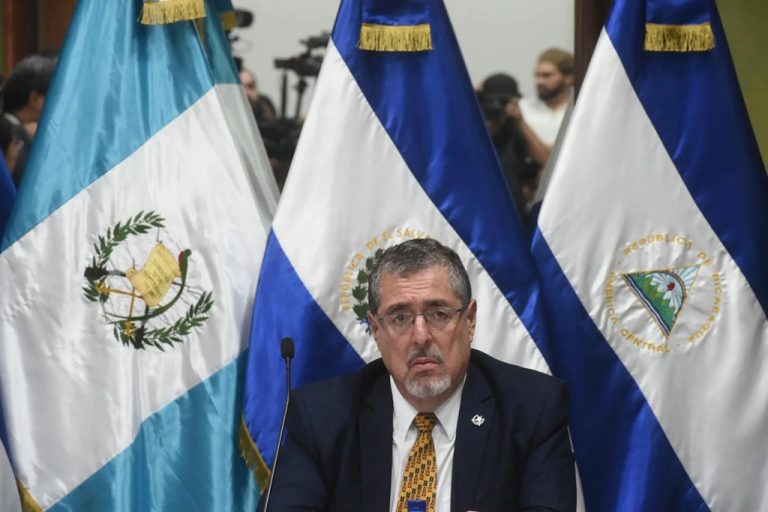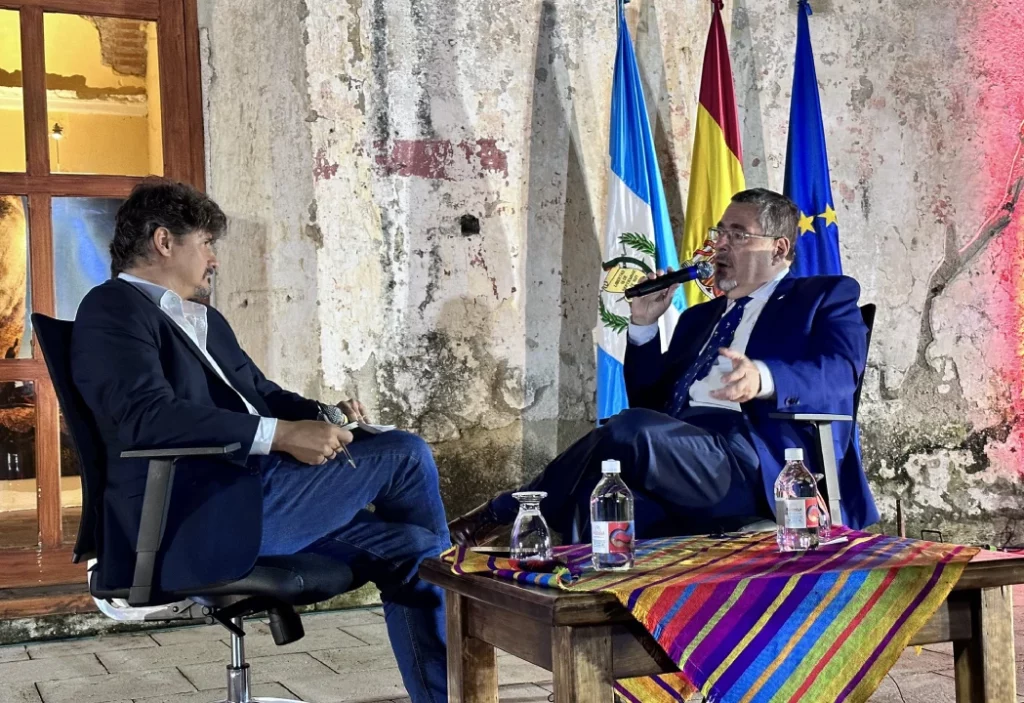30 de octubre 2023

Children of Exile: The Births “Sowing Hope” in the Camp of Nicaraguan Farmers

PUBLICIDAD 1M
PUBLICIDAD 4D
PUBLICIDAD 5D
The president-elect of Guatemala assures that "we are seeing the construction of a pure and simple dictatorship" in Nicaragua

El presidente electo de Guatemala, Bernardo Arévalo de León, atiende una reunión en la sede del Tribunal Supremo Electoral guatemalteco, el 2 de octubre de 2023. Foto: EFE/Edwin Bercián
The president-elect of Guatemala, Bernardo Arévalo de León, was clear in describing the government of Daniel Ortega and Rosario Murillo in Nicaragua as a "pure and simple" dictatorship and rejected the regime's policy of "systematic repression" against the critical or opposing population.
"What we have seen in the Nicaraguan case is systematic repression; the violation of the human rights of the population that is demanding an electoral process; the elimination of institutions simply by design of the Presidency. That is, we are seeing the construction of a pure and hard dictatorship," said Arévalo in a conversation this Friday, October 27, 2023, as part of the Central American Journalism Forum (ForoCap), organized by the Salvadoran newspaper El Faro, in Antigua Guatemala.
The president-elect continued that, in his future government, "we will be clear that we do not approve of the repressive policies that are being exercised" in Nicaragua.
However, he clarified that in "the framework of an international system where it is necessary that the States, in spite of these differences, collaborate reasonably" he will work together with the Ortega government.
Arevalo's remarks came after being asked about his position upon assuming the Presidency of Guatemala and joining the Central American Integration System (SICA) and the Central American Bank for Economic Integration (CABEI).
Arévalo also referred to the re-election bid of Salvadoran President Nayib Bukele. "It is something that clearly challenges democratic principles, but we will have to monitor if this indeed becomes a complete authoritarian drift."
In the interview, conducted by journalist José Luis Sanz – where he also talked about the tensions in Guatemala, his inauguration, his government plan, and the persecution of the press –, he emphasized that he has "no problem in denouncing governments that are following authoritarian drifts," referring to Central American leaders.
Therefore, he will be "practical" with respect to international politics. "It is very clear that an international system based on democratic institutions and the protection of human rights is fundamental for our own survival as a democratic state. Consequently, we will be working in that direction at the international level," he emphasized.
Arevalo said that he has already had some contact with the Government of Xiomara Castro, of Honduras, with whom he expects to have very good "collaborative relations," as well as with other countries.
The 65-year-old politician was elected as president of Guatemala last August 20, 2023 and since then has denounced an "attempted coup" by the State, to prevent his presidential formula and the deputies of his party, Movimiento Semilla, from taking office on January 14, 2024.
"The coup d'état is going to continue, every time the Public Ministry keeps going with this campaign of political exclusion that has been directed against us as a binomial and against my party," he assured.
However, he is confident that the actions against him will fail because there are no legal facts that prevent him from assuming the presidency. But he considers that the actions against him will continue "and as long as they continue, they will give rise to actions that may be annoying, uncomfortable, even, at some point even dangerous for some people," he warned.

"We do not know if they are going to decide to turn against the members of the Voting Boards, who are citizens who are attacking the magistrates (…) but we are confident that this is going to fail in the end," he affirmed.
Bernardo Arévalo highlighted the participation of the indigenous movements that have led the protests demanding the resignation of the Attorney General and head of the Public Prosecutor's Office (Fiscalía), Consuelo Porras. "It is a social and popular leadership, spontaneous, that did not wait for indications from any political actor to take to the streets, to defend," he said.
He acknowledged that it is a sector "that is extremely jealous that this quality of authorship is understood." It's clear to him that "its workspace is that space of citizen protest in the street. And we are doing our part in the legal defense of the whole process."
During October, the indignation and rejection of Guatemalans against Porras reached its peak with the blockade of more than 100 highways throughout the country, as well as massive demonstrations to demand his resignation for intervening in the electoral process.
Besides Porras, prosecutors Rafael Curruchiche and Cinthia Monterroso have been pointed out by the population as "coup perpetrators" who try to manage power at their whim to prevent the investiture of the new president. They are joined by criminal judge Fredy Orellana.
The president-elect highlighted that the concept of leaders must be reconsidered. "Instead of thinking of charismatic, heroic, superman type leaders, what we need is articulating leaderships, that begin to grasp the different sectors of society."
"People are going to have to understand that the President of the Republic has to talk internally with all the sectors that are committed to democracy, that wish to work within the framework of a democratic system, in a rule of law," he stressed.
Arévalo took the opportunity to emphasize that before entering the political field, he had experience in peace processes which taught him that "the leaderships of peacebuilding are always collective leaderships", for which he does not feel "watered down" in seeing himself as a mediator figure in the process that is taking place in his country.
In the over one-hour interview, the politician explained that his government plan is aimed at fighting corruption because it is the main aspect that hinders the social development of his country.
"In the Parliament's Finance Committee, they are introducing measures that are questionably legal. For example, forcing every bond placement to have to be submitted for approval by Congress beforehand, something that does not exist until now, but which they are introducing at this moment. They are taking budget from the areas of Health and Education to pass them to the Public Ministry or the Supreme Court of Justice", he warned.
In his opinion "it is a defeat for the country that we have a Finance Commission in the Congress of the Republic that does not understand that the people are demanding an end to corruption. And that, knowing that it is going to lose control, increases the mechanisms of corruption, so that they continue to be in force through the budget in the coming year".
Bernardo Arévalo said that, before taking office, they are making changes against corruption. One of these is an audit of the personnel of the different state agencies to identify phantom or unnecessary positions.
"What we are going to do is to face the fight against corruption from all possible angles. But there are a series of angles that go from prevention, generation of institutional reforms within the Executive, the transformation of the public culture around corruption, which is where we can advance until the moment when there are conditions to advance in other areas," he explained.
The president-elect affirmed that he held a meeting with the Guatemalan journalists' union to whom he reiterated that, during his government, there will be freedom of the press and the persecution of journalists will cease.
"We believe that freedom of the press is a fundamental element of democracy," he mentioned.
When asked about the arrest and conviction of journalist José Rubén Zamora, the politician pointed out that, although they cannot intervene judicially, "there will be changes to guarantee a fair trial".
"We have to take into account that the situation of José Rubén Zamora and the persecution of journalists and human rights defenders comes precisely from the Executive, and that will disappear because we will have a government that will be committed to freedom of the press," he promised.
Therefore, "I believe that we are going to do enough simply by transforming the way in which freedom of the press and the protection of human rights are considered."
This article was originally published in Spanish in Confidencial and translated by our staff.
PUBLICIDAD 3M
Confidencial es un diario digital nicaragüense, de formato multimedia, fundado por Carlos F. Chamorro en junio de 1996. Inició como un semanario impreso y hoy es un medio de referencia regional con información, análisis, entrevistas, perfiles, reportajes e investigaciones sobre Nicaragua, informando desde el exilio por la persecución política de la dictadura de Daniel Ortega y Rosario Murillo.
PUBLICIDAD 3D